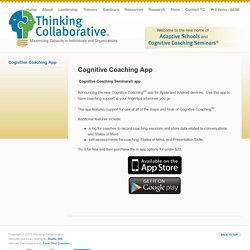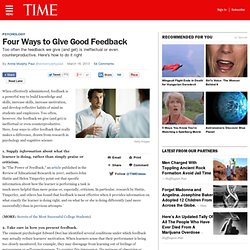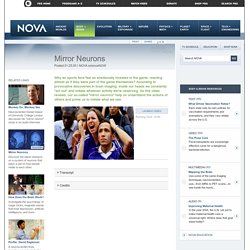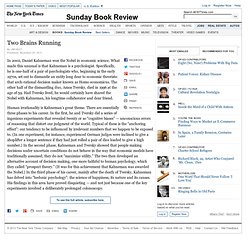

Jay B Roth sur Twitter : "Day 1 #cognitivecoaching feedback @Think_Collab... Greg Kostiuk sur Twitter : "Axiom of Coaching #hs4 @Think_Collab #cognitivecoaching... Thinking Collaborative. Cognitive Coaching Seminars® app Announcing the new Cognitive CoachingSM app for Apple and Android devices.

Use this app to have coaching support at your fingertips wherever you go. The app features support for use of all of the maps and tools of Cognitive CoachingSM. Additional features include: a log for coaches to record coaching sessions and store data related to conversations and States of Mind self-assessments for coaching, States of Mind, and Presentation Skills Try it for free and then purchase the in app options for under $20. Bernadette Howard sur Twitter : "Refreshing, reflecting and refocusing at #cognitivecoaching @PLITasmania @SallyMilbourne @SBFrost @Think_Collab. Four Ways to Give Good Feedback. When effectively administered, feedback is a powerful way to build knowledge and skills, increase skills, increase motivation, and develop reflective habits of mind in students and employees.

Too often, however, the feedback we give (and get) is ineffectual or even counterproductive. Here, four ways to offer feedback that really makes a difference, drawn from research in psychology and cognitive science: 1. Supply information about what the learner is doing, rather than simply praise or criticism.In “The Power of Feedback,” an article published in the Review of Educational Research in 2007, authors John Hattie and Helen Timperley point out that specific information about how the learner is performing a task is much more helpful than mere praise or, especially, criticism.
(MORE: Secrets of the Most Successful College Students) 2. According to Deci, a third feedback condition that can reduce learners’ engagement is an uncomfortable sense of competition. 3. 4. NeuroLeadership Institute’s Chief, on Shared Goals. Tips for Making Decisions, and Sticking to Them. The Power of Peer Coaching. Mirror Neurons. Mirror Neurons PBS air date: January 25, 2005 ROBERT KRULWICH: Hello again.

Gaze into a mirror, and what do you see? Well, I see my face, of course. But in my face I see moods, I see shifts of feeling. We humans are really good at reading faces and bodies. Ask yourself, "Why do people get so involved, so deeply, deeply involved, with such anguish, such pain, such nail biting tension over football? " COMMENTATOR: The Cleveland Browns are gambling on defense. ROBERT KRULWICH: Why are we such suckers for sports? Well, as it happens, scientists have an explanation for this strange ability to connect. DANIEL GLASER: It had never been found on a cellular level before. ROBERT KRULWICH: A set of brain cells, found on either side of the head, among all the billions of long branching cells in our brain, these so-called "mirror neurons," have surprising power.
(NEURON FIRING): Clack, clack, clack. ROBERT KRULWICH: ...whenever the monkey would grab for a peanut. ROBERT KRULWICH: ...the neuron would fire. Megan Tschannen-Moran's Web Site. Dr.

Megan Tschannen-Moran is a professor of educational leadership at the College of William and Mary School of Education. She prepares prospective school leaders for K-12 building-level and central office positions in the Educational Policy, Planning, and Leadership program. Her research focuses on relationships of trust in school settings and how these are related to important outcomes such as the collective efficacy beliefs of a school faculty, teacher professionalism, and student achievement. Another line of research examines teachers’ self-efficacy beliefs and the relationship of those beliefs to teacher behavior and student outcomes. She has published more than 40 scholarly articles and book chapters in highly regarded journals such as the Education Administration Quarterly, the Journal of Educational Administration, and Teachers College Record. Brain-related research. Center for Cognitive Coaching. Thinking, Fast and Slow — By Daniel Kahneman — Book Review.
Human irrationality is Kahneman’s great theme.

There are essentially three phases to his career. In the first, he and Tversky did a series of ingenious experiments that revealed twenty or so “cognitive biases” — unconscious errors of reasoning that distort our judgment of the world. Typical of these is the “anchoring effect”: our tendency to be influenced by irrelevant numbers that we happen to be exposed to. (In one experiment, for instance, experienced German judges were inclined to give a shoplifter a longer sentence if they had just rolled a pair of dice loaded to give a high number.) In the second phase, Kahneman and Tversky showed that people making decisions under uncertain conditions do not behave in the way that economic models have traditionally assumed; they do not “maximize utility.” “Thinking, Fast and Slow” spans all three of these phases. Now, this worries me a bit. Or does he?
Such sweeping conclusions, even if they are not endorsed by the author, make me frown.